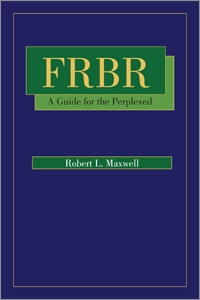
Primary tabs
You don't need to be an ALA Member to purchase from the ALA Store, but you'll be asked to create an online account/profile during checkout to proceed. This Web Account is for both Members and non-Members. Note that your ALA Member discount will be applied at the final step of the checkout process.
If you are Tax-Exempt, please verify that your account is currently set up as exempt before placing your order, as our new fulfillment center will need current documentation. Learn how to verify here.
- Description
- Table of Contents
- About the author
- Reviews
"FRBR has the potential to inspire dramatic changes in library catalogs, and those changes will greatly impact how reference and resource sharing staff and patrons use this core tool."
--netconnect, 2005
FRBR – Functional Requirements for Bibliographic Records– is an evolving conceptual model designed to help users easily navigate catalogs and find the material they want in the form they want it – be that print, DVD, audio, or adaptations. Developed by the International Federation of Library Associations and Institutions Cataloging Section, FRBR is now being integrated into cataloging theory and implemented into systems and practice.
Cataloging expert Maxwell offers clear concise explanations for every librarian interested in the next phase of access to their library's digital information. He answers such questions as
- What is FRBR and how does it work?
- How will FRBR affect libraries?
- Do all librarians need to be concerned, or just those doing cataloging?
- How do authority records fit into the picture?
With an understanding of the FRBR model, public and academic librarians, technical and public services librarians, and administrators can get a jump on this vital new cataloging technology to make catalogs more user-friendly.
Acknowledgments
1. Introduction
2. The Entity-Relationship Model
3. The FRBR Entities
4. Relationships
5. The User Tasks
6. The FRBR Model and the Existing MARC and AACR2-Based Cataloging Model
Suggested Readings
Index
Robert L. Maxwell
Robert L. Maxwell is a Senior Librarian at the Harold B. Lee Library, Brigham Young University, where he has chaired the Special Collections and Formats Catalog Department. He is the author of Maxwell’s Handbook for RDA (ALA Editions, 2013), which won the 2014 ABC-CLIO Award for Best Book in Library Literature and the ALCTS 2015 Outstanding Publication Award. He also won the ALA Highsmith Library Literature Award for 2002 for the book Maxwell’s Guide to Authority Work (ALA Editions, 2002) and is the author of a number of other books on cataloging published by the American Library Association. He has taught cataloging at Brigham Young University and the University of Arizona School of Information Resources and Library Science and has chaired the Bibliographic Standards Committee of the Rare Books and Manuscripts Section of the Association of College and Research Libraries (ACRL). He has been a voting member of the ALCTS Committee on Cataloging: Description and Access, the body responsible for developing official ALA positions on additions to and revisions of RDA, and currently is the liaison between that committee and ALA’s Subject Analysis Committee. In addition to an M.L.S. from the University of Arizona, he holds a J.D. from Brigham Young University and a Ph.D. in classical languages and literatures from the University of Toronto. Maxwell was awarded the 2024 Margaret Mann Citation, sponsored by OCLC and Core: Leadership, Infrastructure, Futures.
"Truly helps the confused or unknonwing...a valuable resource for the professional librarians of library student."
--American Reference Books Annual
"The ultimate goal--'to help users easily navigate catalogs and find the material they want in the form they want it'--is something all of us can get behind, and books like this might help move it closer to implementation."
--American Libraries
"...written in a tone that appeals to the uninitiated as well as to the knowledgeable reader."
--American Reference Books Annual
"If anyone should attempt to write a step-by-step guide to FRBR, it's Maxwell. He has a gift for making the complexities of cataloging and metadata clear ... if you want to get a better handle on FRBR concepts and possible future implementations, it's a must-read."
--The Code4Lib Journal


